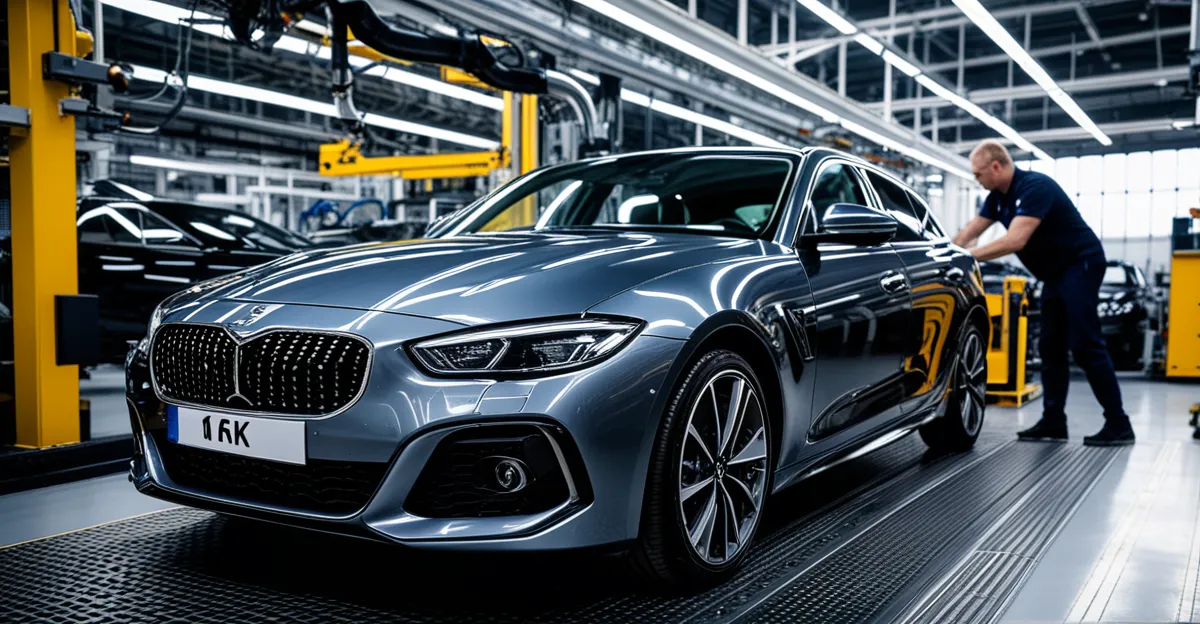Defining Innovation in the UK Automotive Sector
Innovation in the UK automotive sector is defined by more than just new products; it encompasses the entire manufacturing process, technological breakthroughs, and a commitment to sustainability. In this context, UK automotive innovation refers to integrating cutting-edge technology, improving production methods, and addressing environmental challenges unique to the British manufacturing landscape.
Key elements shaping innovation include advanced technology such as electrification and digital control systems, optimized manufacturing processes that enhance flexibility and efficiency, and sustainable practices aimed at reducing carbon footprints. The UK manufacturing context, characterized by its tradition of engineering precision and an increasing push for green solutions, deeply influences how innovation is approached.
Also to see : What strategies are UK automotive companies using to attract young talent?
The UK’s regulatory framework and its focus on climate goals drive automotive innovation towards sustainability. This local context promotes solutions that balance technological advancement with environmental responsibility, distinguishing the UK automotive sector’s innovation from other global markets.
Understanding innovation here means recognizing its multidimensional nature: it’s not just about new car models but about transforming how vehicles are designed, built, and how materials and energy are managed throughout the lifecycle. This comprehensive approach ensures the UK remains competitive and aligned with global shifts in automotive manufacturing.
Also to read : How are sustainable practices being integrated into UK car manufacturing?
Technological Advancements Transforming Manufacturing
The rise of automation has been pivotal in shaping the UK automotive innovation landscape. Automation and robotics enhance production efficiency by handling repetitive tasks on UK production lines, leading to faster assembly times and reduced human error. This shift aligns with the sector’s goal to increase manufacturing efficiency while maintaining high quality standards.
Digital technology in UK automotive manufacturing includes the use of Artificial Intelligence (AI), the Internet of Things (IoT), and advanced data analytics. These tools enable real-time monitoring and predictive maintenance, reducing downtime and boosting reliability. For example, AI-driven systems can optimize resource allocation, ensuring smoother workflows and minimal waste.
Smart manufacturing is another crucial element, integrating digitized processes and connected machines to create flexible and responsive production systems. Leading UK automotive manufacturers such as Jaguar Land Rover and Bentley have adopted these technologies to streamline operations and innovate vehicle design, showcasing how digital tools translate into tangible improvements.
Overall, the integration of automation, digital technologies, and smart manufacturing continues to redefine the UK’s automotive sector, reinforcing its reputation for technical prowess and innovation-driven manufacturing.
Sustainability Efforts and Eco-Friendly Initiatives
Sustainable manufacturing is at the heart of UK automotive innovation. The definition of innovation in this context goes beyond new models to include green practices embedded in every stage of production. UK automotive manufacturers are increasingly prioritizing materials with lower environmental impact and energy-efficient production methods. These efforts reduce waste, emissions, and resource consumption, reflecting the sector’s commitment to environmental impact UK guidelines.
Government initiatives play a critical role in advancing green automotive innovation. Through funding and regulations, the UK government encourages manufacturers to develop low-emission vehicles and adopt clean technologies. This synergy creates a supportive environment where sustainability drives innovation, helping align industry goals with national climate objectives.
Leading UK manufacturers undertake eco-friendly projects such as integrating recycled materials and transitioning to renewable energy sources within their plants. This emphasis on sustainable manufacturing strengthens the UK manufacturing context by fusing traditional engineering expertise with modern environmental responsibility. Ultimately, these sustainability efforts position the UK automotive sector as an innovator not only in technology but also in its contribution to a greener future.
Impact on Production Efficiency, Quality, and Competitiveness
Innovation in the UK automotive sector directly boosts manufacturing efficiency, enabling faster production while cutting costs. By integrating automation and digital tools, manufacturers reduce manual errors and downtime, resulting in streamlined workflows and increased throughput. This enhanced efficiency translates into quicker time-to-market for new models, a critical factor in maintaining competitiveness.
Quality control UK standards have evolved alongside innovation. Advanced sensors and AI-driven inspection systems monitor production lines in real time, identifying defects early and ensuring consistent product quality. This proactive quality assurance not only meets stringent regulatory requirements but also enhances brand reputation and customer satisfaction.
Competitiveness in automotive manufacturing hinges on balancing speed, quality, and cost-effectiveness. UK manufacturers leverage innovation to differentiate their offerings on the global stage by combining precision engineering with flexible production methods. For example, the use of smart manufacturing enables rapid adjustment to changing demand or customization requests without sacrificing efficiency or quality.
Overall, the confluence of higher manufacturing efficiency, stringent quality control UK practices, and adaptive capabilities strengthens the sector’s global standing, driving sustained growth rooted in innovative excellence.
Government Initiatives and Support for Innovation
Government support plays a crucial role in shaping UK automotive innovation by providing targeted funding and effective R&D incentives. These incentives encourage manufacturers to invest in cutting-edge technologies and sustainable production methods, directly impacting the sector’s ability to innovate. For instance, government grants reduce financial risks associated with developing new electric vehicle technologies or implementing advanced automation systems.
The UK automotive policy fosters collaboration between industry, academia, and government research centres, creating innovation hubs that accelerate knowledge exchange and technology transfer. These partnerships enable faster prototyping and wider adoption of green automotive innovation. Moreover, policy frameworks prioritize investments aligned with climate goals, reinforcing the sector’s focus on sustainability alongside technological advancement within the UK manufacturing context.
By supporting startups and established manufacturers alike, government initiatives help expand the innovation ecosystem. This ecosystem includes training programmes that upskill workers in digital technologies and smart manufacturing, ensuring the workforce can meet evolving industry demands. Ultimately, continuous government backing strengthens the UK’s position as a global leader in automotive manufacturing, driving forward a dynamic landscape where innovation thrives.
Notable Recent Advancements and Case Studies
In recent years, UK automotive innovation has accelerated markedly through tangible advancements and practical implementations. Industry examples highlight how cutting-edge technologies translate into measurable production and performance gains. For instance, Jaguar Land Rover’s integration of automation with digital analytics has reduced assembly cycle times by up to 15%, exemplifying the sector’s commitment to combining technology with efficiency.
Recent developments also include the adoption of AI-driven design tools, speeding prototype iterations and enhancing vehicle safety features. Bentley’s use of smart manufacturing techniques demonstrates the fusion of legacy craftsmanship with modern digital control systems, resulting in increased customization without compromising production speed or quality.
Case studies reveal strong evidence of the UK manufacturing context fostering innovation that balances tradition and modernity. These advancements leverage the UK’s engineering skill base while incorporating environmental and digital solutions, meeting both market and regulatory demands.
Expert commentary consistently points to these examples as benchmarks for the sector’s evolution, illustrating how innovation is deeply embedded across design, manufacturing, and sustainability goals. These UK automotive case studies reflect a dynamic, results-driven approach that strengthens the UK’s global competitiveness in automotive manufacturing.
Future Trends and the Evolving Role of Innovation
The future of UK automotive innovation is set to be shaped by emerging technologies that promise to revolutionize the sector. Key upcoming trends include the widespread integration of electric vehicles (EVs), advancements in autonomous driving, and the growth of connected car technologies. These technologies align with the sector’s ongoing commitment to sustainability and digital transformation within the UK manufacturing context.
What are the primary technologies influencing the future of UK automotive? Primarily, electrification is driving a transition to low-emission vehicles, supported by enhanced battery technologies that offer greater range and faster charging. Autonomous vehicle systems leverage AI and sensor fusion to improve safety and efficiency, while connected car platforms use IoT to create smarter, more interactive driving experiences.
Industry experts emphasize that the innovation roadmap will focus on combining these technologies with flexible manufacturing processes. This approach ensures automotive UK producers can adapt rapidly to changing market demands and regulatory requirements. Additionally, the rise of digital twins and advanced simulation tools is expected to optimize design and production cycles further.
In summary, the future of UK automotive hinges on blending cutting-edge technology with sustainable practices, guided by a clear innovation roadmap that supports agility, environmental goals, and global competitiveness.








